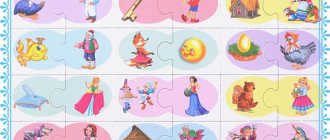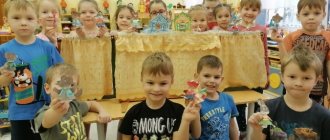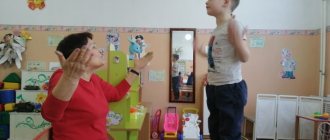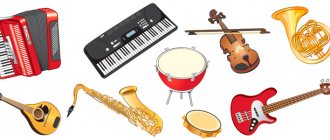Theatrical activity is the most important factor in the development of a preschooler’s personality
One of the most popular and exciting areas in preschool education is theatrical activities. From the point of view of pedagogical attractiveness, we can talk about the versatility, playful nature and social orientation of the theater. Of all types of games, theatrical play has a special impact on the development of the ability to recognize a person’s emotional state by facial expressions, gestures, intonation, the ability to put oneself in the place of another in various situations and find adequate ways to assist. Theatrical activity is an inexhaustible source of development of feelings, experiences and emotional discoveries, a way of becoming familiar with spiritual wealth. As a result, the child learns about the world with his mind and heart, expressing his attitude towards good and evil; learns the joy associated with overcoming communication difficulties and self-doubt.
In pedagogical research, theatrical activities are considered as a condition for the aesthetic education of a child, his artistic abilities, and creativity. An analysis of the literature made it possible to highlight the peculiarities of the perception of theatrical action by preschool children, open contact and exchange of feelings with the characters, the need for individual self-expression, and the child’s desire to reproduce the favorite character. The main problem is related to the development of scripts for children's theaters in a preschool institution and the development of image creation skills. The humanistic idea of education draws the attention of teachers and practitioners to the development of personal values, to the child’s self-expression of his image and type of behavior in the space of peers and adults. Theatrical activity is the optimal condition for solving problems related to the development in a child of the values of compassion, mercy, philanthropy and the ways of their manifestation, thereby forming the experience of life, creating a holistic picture of the world.
It is theatrical activities that make it possible to solve many pedagogical problems relating to a holistic picture of the world, including the formation of the expressiveness of a child’s speech, intellectual and artistic-aesthetic education. When participating in theatrical games, children form ideas about events in the lives of people, animals, and plants, which gives them the opportunity to gain a deeper understanding of the world around them. At the same time, theatrical play instills in the child a sustainable interest in his native culture, literature, and theater. The educational value of theatrical games is also enormous. Children develop a respectful attitude towards each other. They learn the joy associated with overcoming communication difficulties and self-doubt. Thus, from the above we can conclude about the importance of theatrical art in the development of the personality of a preschool child; it allows solving problems related to intellectual, artistic, aesthetic, moral education, and socialization of the individual.
The types and content of theater classes include: 1) general developmental games that develop attention, observation, courage, resourcefulness, and readiness for creativity; 2) rhythmoplastic exercises, which involve the development of motor ability and plastic improvisation; 3) psycho-gymnastic studies aimed at the formation of the cognitive and social-personal sphere; 4) special theatrical games that prepare children for action in stage conditions, where everything is fiction, develop imagination and fantasy; 5) tasks on the culture and technique of speech, improving breathing, diction, intonation and other means of expressive speech; 6) conversations and quizzes about theatrical art; 6) sketches and games for controlling theatrical puppets, developing hand muscles, endurance, and patience.
Through the means of the art of theater, it promotes familiarization with its expressive language, which lays the foundation for the formation of skills of perception, understanding and interpretation of actions that form the moral foundations, ideas, and actions of a person; developing skills of mutual communication and teamwork. In accordance with this approach, the program ensures the development of the personality, motivation and abilities of children in various types of activities in the following areas of development: social-communicative, cognitive, speech, artistic-aesthetic and physical.
At the same time, it is necessary to highlight a number of contradictions that exist in the practice of work of a preschool educational institution in connection with the formation of a holistic picture of the world in children of senior preschool age:
– between teachers’ understanding of the need to solve the actual problem of the developed content of a holistic picture of the world and the lack of systematic and consistent work, which is often situational and pedagogically inappropriate;
– between the use by teachers of traditional types of theatrical activities in the formation of a holistic picture of the world among pupils and ineffective organization, which does not take into account the modern characteristics and interests of older preschoolers, their desire for independence and initiative, children's activity, its satisfaction in theatrical games, as well as developmental potential and the possibilities of the theatrical activity itself;
– between the growing interest of modern preschoolers in integrative activities, in particular, theatrical activities, and its non-systematic use in the pedagogical process, the unpreparedness of teachers and parents for its implementation.
The indicated contradictions and the need to resolve them determine the relevance of the scientific problem, the search for new pedagogical solutions in the aspect of forming a holistic picture of the world of older preschoolers in theatrical activities.
Domestic teachers and psychologists consider theatrical activity as a specific type of artistic and creative activity that is of great importance for the versatile development of preschool children (L. V. Artyomova, L. S. Vygotsky, N. S. Karpinskaya, D. B. Mendzheritskaya, B. M. Teplov, L. G. Strelkova). L. S. Vygotsky defined theatrical activity as the most common type of children's creativity, since the dramatic form of reflecting life impressions is organically inherent in children's nature and finds its expression spontaneously, regardless of the wishes of adults. It includes various symbolic-modeling activities and is built on the organic unity of play, speech, drawing (M. A. Vasilyeva, L. A. Wenger, O. M. Dyachenko, A. A. Leontyev, S. I. Merzlyakova, L. G. Milanovich, N. F. Sorokina, E. L. Trusova).
The specificity of theatrical activity is that it allows you to implement the principles of natural conformity and cultural conformity of education (M. I. Nikitina) through the formation of an “image of the world” (A. N. Leontiev), the development of spatio-temporal orientation, familiarity with the laws of nature - cyclicity, interrelation and interdependence of objects and phenomena of the surrounding reality. At the same time, in the process of theatrical activity, the ability to distinguish the world of ideas, imagination from reality, the real world is formed (L. A. Wenger, O. M. Dyachenko, E. E. Kravtsova, S. N. Nikolaeva, etc.).
In the process of theatrical activities, various communication situations are modeled, coherent speech develops, which is a necessary condition for the child’s adaptation in society (M. A. Vasilyeva, O. L. Knyazeva, R. B. Sterkina, S. A. Kozlova, etc.). Children develop volition, special sensitivity and attention to the actions of people in life, the ability to see and understand the meaning of the simplest human actions, his feelings, relationships with people, nature (A.B. Zaporozhets, L.G. Strelkova, E.L. Trusova, D. B. Elkonin and others). In addition, research emphasizes the universal nature of theatrical activities, since they contribute to the formation of various sign systems, the development of cognitive, motor and emotional spheres, as well as the socialization of children (S. I. Merzlyakova, L. G. Milanovich, N. F. Sorokina and etc.).
In preschool pedagogy, the work of scientists O. V. Akulova, L. V. Artemova, T. N. Karamanenko, S. G. Mashevskaya, T. G. Pen, A. A. Petrova, E. R. was devoted to the problem of theatrical activities. Ragul, B.P. Yusova, etc. Analysis of the works of these authors made it possible to determine the directions that have developed in the study of this issue. L.V. Artemova suggests using theatrical games as a strong pedagogical tool that has a great influence on the child’s personality. S. G. Mashevskaya considers the structure of theatrical activity, which includes three links - writing, performance and perception. This makes it possible to make wider use of children’s creative capabilities, determining their “acting”, “directing” and “spectating” potential. A. A. Petrova highlights two aspects of the closeness of the dramatic form for the child, firstly, the dramatic form of “living out the impressions of life” lies deep in the nature of the child and finds its expression spontaneously. Children's fantasies and images do not remain in the realm of dreams, as with adults. The child wants to translate all his imagination and impressions into living images and actions. Secondly, there is a connection between any dramatization and play. B.P. Yusov sees the development of a child through the means of theater, that is, the child becomes involved in productive creative activity.
Literature:
- Vygotsky L. S. Game and its role in the psychological development of a child / L. S. Vygotsky // Developmental Psychology. - St. Petersburg, 2001. - pp. 56–79.
- Doronova T. N. We play in the theater. Theatrical activities of children / T. N. Doronova. - M.: Education, 2004. - 127 p.
- Komarova T. S. Development of artistic abilities of preschoolers / T. S. Komarova. - M.: Mozaika-Sintez, 2013. - 160 p.
- Komarova T. S. School of aesthetic education / T. S. Komarova. - M.: Kingfisher, 2006. - 416 p.
An essential feature of theatrical activities for children of senior preschool age
In the pedagogical and psychological literature there are various names for theatrical activities: theatrical play activities, theatrical play creativity, theatrical games, theatrical performances, theatrical amateur performances, theatrical activities, etc.
All types of play are, in essence, the child’s art, his creativity. Theatrical play is a typical basis for artistic creativity. Therefore, theatrical play can be called creative play.
Some psychologists are of the opinion that theatrical games cannot be considered as a creative activity, since nothing new is created in them. Indeed, if we approach play with the same standards as adult activities, then the term “creativity” is inappropriate. But this is justified if you look at the problem from the point of view of child development. There is no reason to deny the possibility of creative self-expression of children in theatrical play, since theatrical activity contains creativity and is itself an artistic activity.
According to S.N. Tomchikova, theatrical activity of preschoolers is a specific type of artistic and creative activity, during which its participants master the available means of performing arts and, depending on the chosen role (actor, author, designer, viewer, etc.), participate in the preparation and conducting various types of theatrical performances, becoming familiar with theatrical culture.
Theatrical games are called so, apparently, because of their closeness to theatrical performance. The spectacle is always enjoyable, and the storytelling enhances the game's appeal.
By theatrical games, scholars mean “theatrical games” whose “plots are familiar fairy tales or theatrical performances based on ready-made scripts.”
Theatrical play activities are of great importance for the comprehensive education of children: they develop artistic taste, creative and declamatory abilities, a sense of collectivism is formed, and memory develops.
Feature of theatrical games: They have a ready-made plot, that is, the child’s activity is predetermined by the text of the work. Pedagogical preschool artistic aesthetics of children.
A real theatrical play is a rich field for children's creativity: The text of a work is simply a canvas into which children can weave new storylines, introduce additional roles, change the ending, etc.
It was noted that theatrical games differ from role-playing games not only in the plot, but also in the nature of the gaming activity. Theatrical games are playful performances that have a fixed content in the form of a literary work and are performed by children personally. In them, as in real theatrical art, specific images are created using such means of expression as intonation, facial expressions, gestures, posture and gait.
The pedagogical basis for organizing the process of theatrical activities in preschool educational institutions is the specificity of preschoolers’ perception of theatrical art. In order for this perception to be complete, it is necessary to introduce children to various types of theatrical activities. All theatrical games can be divided into two main groups: Directing games and dramatization games.
The first group - director's games in kindergarten - includes tabletop, shadow theater, and theater on a flannelgraph. Here the child or adult is not an actor, he or she creates the scene, plays the role of a toy character - three-dimensional or flat. He or she acts for him or her, portrays him or her using facial expressions, intonation, and gestures. The child's pantomime is limited. He or she acts with a stationary or sitting figure or toy. The emphasis here is on the language, its themes, intonation, expressiveness, and diction.




